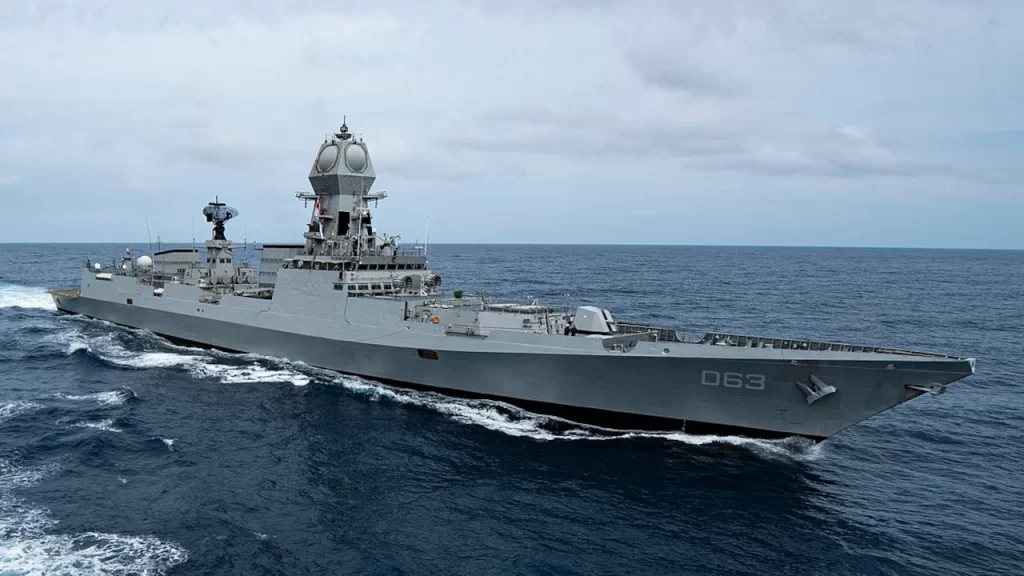
New Horizons: India and Kenya Forge Strategic Maritime and Defense Partnership

In an epoch-making event that underscores the deepening relationship between India and Kenya, the two nations recently inked a landmark Memorandum of Understanding (MoU). This pivotal agreement, signed between Goa Shipyard Limited and Kenya Shipyard Limited, heralds a new era of collaboration in ship design, construction, and capacity building, marking a significant stride in Kenya’s ambitious vision to burgeon as a maritime security stronghold and a shipbuilding hub in East Africa.
This historic MoU was cemented in the high-level talks between India’s Defence Minister, Rajnath Singh, and his Kenyan counterpart, Cabinet Secretary for Defence, Aden Bare Duale. Beyond the ink and paper, the discussions traversed the evolution of the defense rapport between the two countries, maturing from a primarily training-focused relationship to a more strategic partnership. Central to their dialogue was the pressing need for bolstered maritime security in the Indian Ocean, a region that has been beleaguered by multifarious challenges including illegal trafficking, unauthorized fishing activities, and the ever-looming shadow of terrorism.
The talks weren’t just strategic but also symbolic, with Minister Singh presenting 15 pairs of parachutes to the Kenyan forces, a gesture reflecting the spirit of camaraderie and cooperation that underpins the Indo-Kenyan ties. Further solidifying this friendship, India pledged support for the establishment of an advanced CT scan facility in Kenya, underscoring the multifaceted nature of the cooperation extending beyond defense.
One of the meeting’s highlights was the emphasis on capacity building within the defense industry. Mr. Duale lauded the burgeoning prowess of the Indian defense sector, spotlighting potential areas where the Indian industry’s expertise could dovetail with the needs of the Kenyan forces. In a move to foster sustainable skill development, there was a proposition for a ‘training of trainers’ program, aimed at engendering a cascade of knowledge and expertise within the Kenyan forces.
The strategic partnership is not confined to dialogues and discussions. It is poised for action, with both nations concurring on joint training initiatives spanning counter-insurgency and UN peacekeeping operations. Moreover, the defense ministers broached a spectrum of regional security issues, indicative of their shared commitment to peace and stability in the region.
Mr. Duale’s three-day sojourn in India, punctuated by visits to key shipyards and defense industries in Goa and Bengaluru, is emblematic of Kenya’s earnestness to imbibe the best from India’s shipbuilding landscape. This is particularly significant for the Kenya Shipyard Limited (KSL), a military-led enterprise, aspiring to serve an expanded clientele that includes both naval and commercial entities. The MoU is expected to be a linchpin for KSL, propelling its status in Africa’s shipbuilding industry, with Mr. Duale himself accentuating the MoU’s critical role in this regard.
This partnership is further buoyed by robust military ties, recently evidenced by the port calls of Indian Naval ships, Trishul and Sunayna, at Mombasa. These visits are part of a broader tapestry of Indo-Kenyan relations that span across various spheres including healthcare, culture, and trade – the last of which has witnessed a remarkable 40% surge, touching $2.9 billion.
In sum, the MoU is not just a framework for cooperation but a reflection of a shared vision. As Kenya strides forward in its quest to secure its waters and emerge as a shipbuilding powerhouse in East Africa, it finds a partner in India, ready to share its rich repository of experience and expertise. Together, they stand poised to usher in a new chapter of maritime security and collaborative growth in the Indian Ocean region.